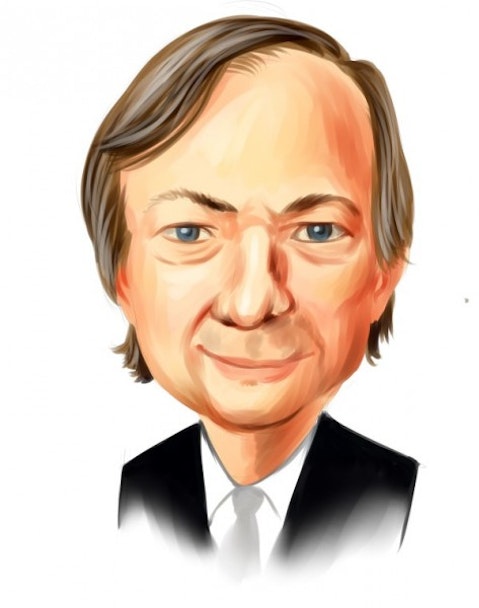Below we present the list of the 5 best growth stocks to buy now according to Ray Dalio. For more background on Ray Dalio and some of his other growth stock picks, check out 10 best growth stocks to buy now according to Ray Dalio.
5. Costco Wholesale Corporation (NASDAQ: COST)
Fifth in the list of the best growth stocks bought by Ray Dalio’s Bridgewater Associates is the American multinational Costco Wholesale Corporation (NASDAQ: COST). The fund purchased 218,662 COST shares worth $77.63 million at the end of September. 61 hedge funds were long in the stock at the end of Q2, down by 10% compared to the first quarter.
Costco is trading at a trailing P/E ratio of 43, according to Yahoo Finance, and the company’s latest e-commerce revenues figure is $26.05 billion. The biggest positions in the stock belong to Berkshire Hathaway and Fisher Asset Management, worth $1313.9 million and $995.4 million, respectively at the end of Q3. Saturna Capital Corporation, the investment management company of Sextant Mutual Funds, stated the following about COST in its Q1 2020 Investor Letter:
“For those not signed up for Amazon Prime, there’s still Costco, another firm in an enviable position when consumers are stocking for hard times.”

Niloo / Shutterstock.com
4. Pinduoduo (NASDAQ:PDD)
1,094,888 shares of Pinduoduo (NASDAQ:PDD), the Chinese Internet giant, is the amount held by Bridgewater in its 13F portfolio on September 30, giving the firm a stake worth $81.2 million at the end of September. Not only Dalio has great expectations from PDD’s performance, as hedge fund sentiment towards the stock has been bullish since Q2, when the number of hedge fund positions increased by around 7% from the previous quarter.
Pinduoduo’s fast growth is indisputable, as the e-commerce channel registers a year-over-year revenue growth of about 89% for Q3, amassing 14.2 billion Chinese Yuan ($2.2 billion). Continuing its customer-centric approach, PDD launched in August a new service called Duo Duo Maicai, hoping to expand market share against its rivals. Nevertheless, Tao Value, an investment management firm that has held bullish positions in PDD for a long time, signals the challenges that the company might face. Here is that Tao Value had to say in its Q3 2020 investor letter:
“Pinduoduo (ticker: PDD) dragged 93 bps this quarter. Investors had high expectation on Pinduoduo coming into this quarter, yet the reported Q2 GMV & revenue fell short of such hype. The stock dropped 14% on the earnings day alone. On business side, management indicated its strategic shift to develop technology solutions for the vast, yet under-digitalized agriculture value chain in China. I think it is a difficult but meaningful problem to tackle.”

Ray Dalio of Bridgewater Associates
3. JD.Com, Inc. (NASDAQ:JD)
Dalio slightly increased the position in JD.Com, Inc. (NASDAQ:JD), the technology-driven Chinese retailer. Bridgewater’s stake in the JDD is currently worth $129.5 million at the end of September, up by 21% from a quarter earlier. 87 hedge funds held positions in the stock at the end of June against the all time high of 90 at the end of the first quarter.
JD.com announced a positive earnings surprise of 30% in Q3, and its stock returned 35.5% since the end of June (through 10/16), outperforming the market by an even larger margin. According to our calculations, JD.Com, Inc. ranked #27 in our 30 most popular stocks among hedge funds, 2020 Q1 rankings. Here is Dan Loeb’s optimistic review of the two e-commerce giants, JD and Alibaba:
“During the quarter, we took advantage of jitters about China’s relationships with Hong Kong and the U.S. that created an air pocket in trading of Chinese‐related shares to establish new positions in e‐commerce leaders Alibaba and JD.com. As we have articulated in prior letters3, our outlook for Alibaba and the broader Chinese e‐commerce market is bright. We believe online gross merchandise value (“GMV”) will grow at a mid‐teens CAGR over the next five years, propelled by both (1) rising consumption per capita, as the Chinese retail market is equal in size to the U.S. despite four times as many consumers, and (2)increased penetration of retail by online, a trend which we believe has been structurally accelerated by the COVID‐ 19 pandemic.
As the e‐commerce market matures, we believe Alibaba & JD will leverage scale and growing repositories of transaction data to increase monetization of their platforms through targeted advertising to improve revenue yields (revenues as a percentage of GMV) from a starting point of less than 4% today. As a point of comparison, brick‐and‐mortar retail store rent expenses in China are greater than 10% of sales on average, which provides a significant umbrella for online marketplaces to take a greater share of GMV through a combination of commission and advertising spending as online retailer cost structures converge with brick‐ and‐mortar retail.”

2. Alibaba Group (NYSE: BABA)
Bridgewater fortified its stake in Alibaba Group (NYSE:BABA) during Q3 by 40%, valued at $392.2 million, a much larger position relative to the one in Alibaba’s rival, JD.Com. The stock was in the portfolios of 166 hedge funds tracked by Insider Monkey at the end of September. Our calculations also showed that BABA ranks #4 among the 30 most popular stocks among hedge funds.
BABA gained around 30% from the end of Q2 (through November 24). In its Q3 2020 Investor Letter, Rowan Street Capital highlighted Alibaba’s control over the entire value chain:
“Alibaba’s integrated ecosystem connects and controls the whole value chain of branding, broadcasting, sales conversion and sharing. That’s very different from how it works in the U.S., where internet giants such as Amazon, Facebook and Alphabet are individually dominant in certain parts of the value chain, but not in the complete manner that Alibaba has achieved. None has an ecosystem that connects the entire marketing and commerce value chain from branding, broadcasting and sales conversion. Alibaba connects the entire value chain.
[…] We believe the odds are still in our favor to earn long-term double-digit compounded returns from our Alibaba investment even from current market levels.”
You can read more about their analysis of Alibaba here.

1. SPDR Gold Trust (NYSE:GLD)
This isn’t really a growth stock you might think. However, it really is. Investors buy gold because they think its price in terms of US dollars will or could go up. It may go up a lot if printing trillions of dollars out of thin air to cover the budget deficits becomes the standard operating procedure of the Federal Reserve and the U.S. Treasury. Investors usually invest in gold as a hedge.
There were a total of 65 hedge funds with long GLD positions at the end of the third quarter. There are also other hedge fund managers who invest directly in physical gold, so the actual number of hedge funds that invest in gold is much higher. The total value of hedge funds’ GLD positions was nearly $3.5 billion. Ray Dalio has the largest position in GLD among all hedge funds tracked by Insider Monkey. Dalio’s GLD bet was worth $967 million.
Please see also 10 stocks billionaire Ray Dalio just bought and 10 stocks new Mets owner Steve Cohen is buying.
Disclosure: None.





